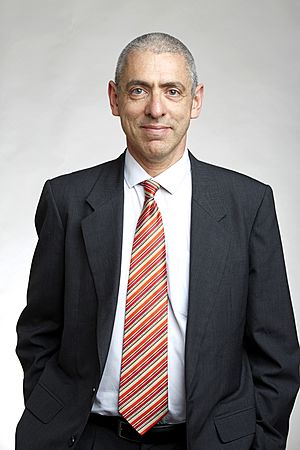Peter Dayan facts for kids
Quick facts for kids
Peter Dayan
|
|
|---|---|

Royal Society 2018
|
|
| Alma mater | University of Cambridge (BA) University of Edinburgh (PhD) |
| Known for | proposing dopamine for reward prediction error, and developing Q-learning |
| Spouse(s) | Li Zhaoping |
| Awards | Rumelhart Prize (2012) The Brain Prize (2017) |
| Scientific career | |
| Fields | Computational neuroscience Reinforcement learning |
| Institutions | Max Planck Institute for Biological Cybernetics University College London Massachusetts Institute of Technology Uber University of Toronto Salk Institute |
| Thesis | Reinforcing connectionism : learning the statistical way (1991) |
| Doctoral advisor | David Willshaw |
Peter Dayan is a famous British scientist. He studies how our brains work and how computers can learn. He is a director at the Max Planck Institute in Germany.
Professor Dayan is a leader in a field called reinforcement learning. This is about how living things and computers learn by trying things and getting rewards or punishments. He helped create an important computer learning method called Q-learning. He also wrote a well-known book about how the brain works like a computer.
He is known for connecting how our brains learn with how computers learn. He looks at how brain chemicals, called neurotransmitters, help us learn from our mistakes and successes.
Contents
Learning and Education
Peter Dayan first studied mathematics at the University of Cambridge. After that, he went to the University of Edinburgh to get his PhD. His studies there focused on how we learn and remember things, especially how our brains learn from experience.
Career and Research Journey
After finishing his PhD, Professor Dayan worked with other top scientists. He did research at the Salk Institute and the University of Toronto.
Later, he became a professor at the Massachusetts Institute of Technology (MIT) in the United States. In 1998, he moved to University College London (UCL) in the UK. He became a professor and director there in 2002.
Since September 2018, he has been a director at the Max Planck Institute for Biological Cybernetics in Germany. He continues his important research there.
Awards and Special Recognition
Professor Dayan has received many important awards for his work. In 2012, he was given the Rumelhart Prize. This award is for people who make big contributions to understanding how the mind works.
In 2017, he received The Brain Prize. This is a very important award for brain research. In 2018, he was chosen as a Fellow of the Royal Society. This is a special honor for top scientists in the UK. In 2023, he also became a member of the Academia Europaea.
See also
- Helmholtz machine
References
 | Jessica Watkins |
 | Robert Henry Lawrence Jr. |
 | Mae Jemison |
 | Sian Proctor |
 | Guion Bluford |

